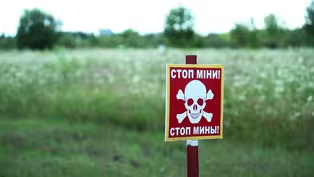
What led to the rat boom and how cities are responding
Clip: 9/14/2023 | 5m 4sVideo has Closed Captions
What led to the rat population boom and how cities are responding
Rats, the furry nuisance that once was a sometimes issue, have become a bigger problem over the pandemic years. Courtney Norris and Dorothy Hastings explore what led to the rise in the rat population.
Problems playing video? | Closed Captioning Feedback
Problems playing video? | Closed Captioning Feedback
Major corporate funding for the PBS News Hour is provided by BDO, BNSF, Consumer Cellular, American Cruise Lines, and Raymond James. Funding for the PBS NewsHour Weekend is provided by...

What led to the rat boom and how cities are responding
Clip: 9/14/2023 | 5m 4sVideo has Closed Captions
Rats, the furry nuisance that once was a sometimes issue, have become a bigger problem over the pandemic years. Courtney Norris and Dorothy Hastings explore what led to the rise in the rat population.
Problems playing video? | Closed Captioning Feedback
How to Watch PBS News Hour
PBS News Hour is available to stream on pbs.org and the free PBS App, available on iPhone, Apple TV, Android TV, Android smartphones, Amazon Fire TV, Amazon Fire Tablet, Roku, Samsung Smart TV, and Vizio.
Providing Support for PBS.org
Learn Moreabout PBS online sponsorshipAMNA NAWAZ: Well, the rat population is on the rise, going from occasional public nuisance to public enemy number one in some cities.
To explain what's fueling this furry affliction, our Courtney Norris and producer Dorothy Hastings bring us this report.
COURTNEY NORRIS: On a hot Wednesday afternoon in the nation's capital, Gerard Brown is patrolling the alleyways of Northwest D.C., looking for signs of rats on the move.
GERARD BROWN, D.C. Department of Health: I'm concerned about any rat in the city.
You know, one rat is too many.
COURTNEY NORRIS: Brown has led D.C. Health's rodent abatement program for 22 years.
And, recently, he says, rats have become more unpredictable.
GERARD BROWN: So in the years with the pandemic, it went up.
Rats started coming into residential areas from the closed restaurants and stuff.
And they were desperate.
COURTNEY NORRIS: Last fall, the pest control company Orkin ranked Washington, D.C., as fourth on its list of America's most rat-infested cities, behind Chicago, New York and Los Angeles.
That makes Washington, D.C., the second rattiest city on the East Coast.
Renowned urban rodentologist Bobby Corrigan says many cities are dealing with a similar issue.
Are we experiencing a rat boom?
BOBBY CORRIGAN, Urban Rodentologist: I characterize it more like we have been on a slow boil for 50 years, but not really paying close attention to the numbers scientifically the way we should.
For many years, we just considered this as a vermin issue, instead of a wildlife species.
We just figured, if you see rats, just put out some poison, put out some traps, hire a pest control professional, it's not a big deal.
At the city level, around the world, it is a big deal.
COURTNEY NORRIS: D.C., like many cities, has experienced an uptick in rat-related extermination calls.
When rats are reported, Brown's team heads to the site to treat the scene, putting rat poison inside burrows and covering holes.
TONY DANTLEY, Code and Rodent Inspector, D.C. Health: We really are out here doing as much as we can, as hard as we can, because we understand.
I don't want rats running around in my yard.
COURTNEY NORRIS: That's a sentiment shared by D.C. resident Joel Edwards.
JOEL EDWARDS, D.C. resident: D.C. has the biggest rats I have ever seen in my life.
COURTNEY NORRIS: Edwards moved to this neighborhood in Northeast D.C. in 2020.
JOEL EDWARDS: I would say since the day we bought the house and months going on after that, we were dealing with trying to poison rats outside our house and finding giant dead rats all around.
COURTNEY NORRIS: Other cities across the U.S. have been tackling the same ratty problem.
ERIC ADAMS (D), Mayor of New York: Everyone that knows me, they know one thing.
I hate rats.
COURTNEY NORRIS: In New York City, Mayor Eric Adams last year declared rats public enemy number one.
Rat sightings were up 71 percent from 2020 to 2022.
KATHLEEN CORRADI, Director, Rodent Mitigation, New York City: When were talking about rat fighting, it's not easy, but it's achievable to get a big mark down in populations.
COURTNEY NORRIS: Kathy Corradi is the first ever citywide director of rodent mitigation in New York City.
In the new role, her sole focus is reducing the number of rats across all five boroughs.
As part of New York's citywide approach, restaurants, bodegas, delis, and grocery stores are now required to dispose of trash in secure containers, rather than directly on the street, a policy impacting 40,000 businesses.
KATHLEEN CORRADI: One of the tricky things about rats is we have no rent rat census, so there is no firm counts of rat populations.
We can engineer our way out of a lot of this.
But then we need people to do the behaviors.
And as anyone knows, behavior change is really hard.
COURTNEY NORRIS: In the last three months, the city has seen a 20 percent decline in rat sightings.
In D.C., Mayor Muriel Bowser allocated $3.4 million in next year's fiscal budget to begin replacing all residents' trash cans over the next eight years.
For Joel Edwards, that's a welcomed move.
After several visits from D.C. Health, hiring a pest control company and home renovation to seal off holes, he's had some relief in the last few months.
The rats may be gone, but the emotional damage is not.
JOEL EDWARDS: There's a little rat PTSD.
And once it's in you, it's in you.
You can't really get it out of your mind.
They're everywhere.
COURTNEY NORRIS: But if you think you hate rats, Corrigan says, think again.
BOBBY CORRIGAN: The rat has added 25, maybe 30 years to our longevity as a species.
We have studied it backwards, forwards, upside down, psychologically, medically.
So, to some degree, I would say to everybody, when you walk down the street, if you do see a rat, before you think about how we're going to manage it, say, by the way, thanks a lot.
COURTNEY NORRIS: Easier said than done.
For the "PBS NewsHour," I'm Courtney Norris.
AMNA NAWAZ: You can watch and read more of our reporting on the rat problem many cities are facing online at PBS.org/NewsHour.
Biographer Walter Isaacson on what motivates Elon Musk
Video has Closed Captions
Clip: 9/14/2023 | 8m 36s | Walter Isaacson on his Elon Musk biography and what motivates the controversial tech CEO (8m 36s)
Flooding sparks scrutiny of Libya's divided government
Video has Closed Captions
Clip: 9/14/2023 | 4m 43s | Catastrophic flooding sparks renewed scrutiny of Libya's divided government (4m 43s)
New drone tech could help clear unexploded mines in Ukraine
Video has Closed Captions
Clip: 9/14/2023 | 8m 28s | New drone technology could make it easier to clear unexploded bombs, mines in Ukraine (8m 28s)
Regional theaters fight to save historic art form
Video has Closed Captions
Clip: 9/14/2023 | 8m 34s | A look at the regional theaters fighting to save their historic art form (8m 34s)
'Tyranny of the Minority' writers say democracy is at risk
Video has Closed Captions
Clip: 9/14/2023 | 7m 25s | 'Tyranny of the Minority' writers say Constitution not strong enough to protect democracy (7m 25s)
What led to Hunter Biden's indictment on firearms charges
Video has Closed Captions
Clip: 9/14/2023 | 4m 48s | hat led to Hunter Biden's indictment on firearms charges and the legal battle ahead (4m 48s)
Providing Support for PBS.org
Learn Moreabout PBS online sponsorship
- News and Public Affairs

FRONTLINE is investigative journalism that questions, explains and changes our world.

- News and Public Affairs

Amanpour and Company features conversations with leaders and decision makers.












Support for PBS provided by:
Major corporate funding for the PBS News Hour is provided by BDO, BNSF, Consumer Cellular, American Cruise Lines, and Raymond James. Funding for the PBS NewsHour Weekend is provided by...





